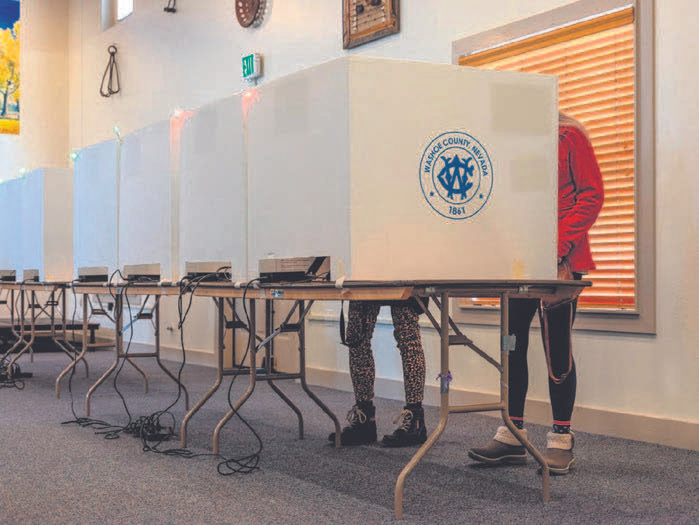
From The Editorial Board
True political bravery — the principled stand, prioritizing the nation over party pressures, and the readiness to sacrifice careers for the greater good — has become increasingly scarce in a divided society. It deserves to be acknowledged and fostered whenever it arises, particularly in defense of essential American institutions, such as our electoral system. The unfortunate reality is that the nation will likely require much more of this in the forthcoming months.
Across various states, Republicans have systematically obstructed citizens’ voting access and complicated the tasks of election workers who count those votes. They are challenging thousands of voter registrations in Democratic regions, compelling officials to manually restore entirely valid voters to the lists. They have been aggressively intimidating election personnel who upheld the integrity of the 2020 elections against fraudulent claims. They attempt to invalidate mail-in ballots received after Election Day, regardless of whether they fulfill the legal postmark requirements. They are creating obstacles to certifying election results and even trying to alter how states distribute their electors, in hopes of facilitating a win for Donald Trump or assisting him in overturning a loss in the elections.
Though many of these actions occurred behind closed doors, this effort is far from hidden. Last month, Trump openly threatened to investigate and imprison election officials nationwide who contradict his falsehoods.
In the face of this systematic attack on the institutions and processes that support American democracy, the most crucial safeguard is the public servants, both elected and volunteers, who persist in carrying out their roles.
Consider Mike McDonnell, a Republican state senator from Nebraska, who exemplified this by announcing last month that he would not give in to the intense, last-minute pressure from his party’s national leaders, including Trump, to secure an additional electoral vote for Trump.
Presently, Nebraska allocates most of its electors by congressional district, and while much of the state leans conservative, polls indicate Vice President Kamala Harris is set to win the elector from the 2nd Congressional District, which encompasses Omaha, the state’s largest city. In the incredibly close margins of the 2024 election, this could be the deciding vote. This was the strategy of Nebraska’s Republican lawmakers, who waited until it was too late for Democrats in Maine, with a similar system, to amend state rules to prevent one congressional district from selecting a Republican elector.
“Elections should provide every voter the opportunity to be heard, regardless of their identity, residence, or party allegiance,” stated McDonnell, who joined the Republicans earlier this year after being ousted from the Democratic Party due to his stances on abortion rights and gender-affirming care.
The nation will require more than a handful of Mike McDonnells to navigate the upcoming months, especially if Harris emerges victorious and Trump follows through on his threats to challenge the legitimate results, spreading deceit, disorder, and, reminiscent of 2021, violence. It’s a challenge to stand firm against an escalating anti-democratic movement that refuses to accept electoral outcomes it does not win.
In the face of real threats to their safety, Americans nationwide — from judges to poll workers and election officials — have performed their duties with integrity and honor, and have generally received support from voters for their actions. In 2022, at least four election deniers backed by Trump who sought to become secretaries of state faced defeat in their races. The struggles continue in numerous states this year, with some MAGA candidates for office pledging to abolish all mail-in voting and early ballots.
It’s crucial for voters to dismiss these conspiracy proponents in November, but the greatest obligation falls on those wielding significant power. This means top Republicans, some of whom have risked their careers to safeguard the country against Trump and the MAGA movement, and who have now voiced support for the rule of law and the Constitution: Rusty Bowers, the former speaker of the Arizona House of Representatives, who refused to condone the Trump team’s baseless accusations of election fraud. Mike Pence, the former vice president, who, amidst life threats from rioters on Jan. 6, 2021, fulfilled his constitutionally mandated duties and has since refrained from endorsing Trump. Liz Cheney, a high-ranking House Republican until she spearheaded the inquiry into the Jan. 6 insurrection. And Mitt Romney, the Utah senator, who voted to convict Trump during his second impeachment for inciting insurrection.
Standing against Trump and the MAGA agenda to dismantle the outcomes of free and fair elections has often come at a significant cost to these individuals, affecting their relationships and, at times, their safety and that of their families. For this, they earn our admiration and appreciation.
Yet far too few of these champions will remain in office as the 2024 elections approach. Others must rise to the occasion. In the coming weeks and months, poll workers, state officials, and Republican members of Congress may face pressure to cast doubt on or even attempt to undermine election outcomes that do not favor Trump. If the recent past serves as any indication, they might be called upon to prevent prospective voters from accessing the polls, to scrutinize ballots from Democratic precincts, to refuse the certification of valid election results, and even to commit election fraud by claiming to be presidential electors.
The threat to the future of American democracy is serious and will not dissipate naturally. The rule of law endures only through the efforts of ordinary, honest individuals choosing to uphold it, in significant and subtle ways, every day.
